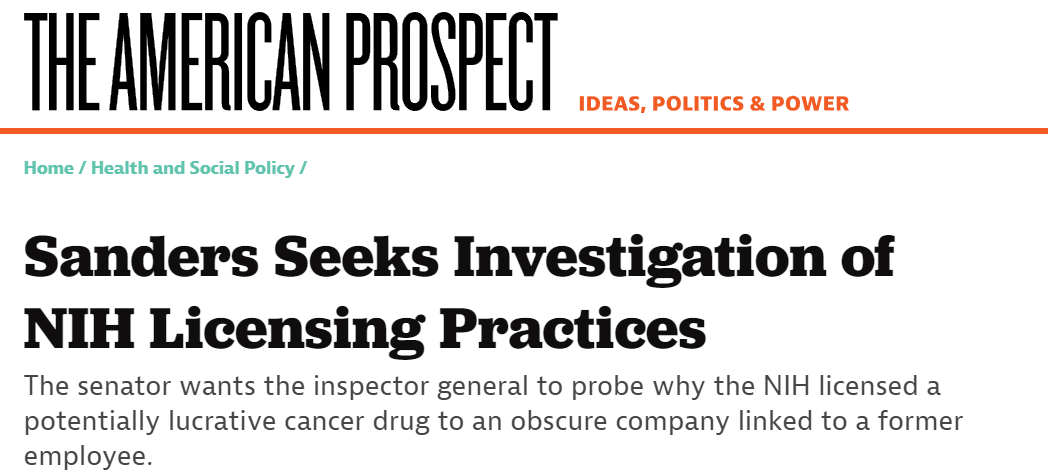Welcome to DU!
The truly grassroots left-of-center political community where regular people, not algorithms, drive the discussions and set the standards.
Join the community:
Create a free account
Support DU (and get rid of ads!):
Become a Star Member
Latest Breaking News
General Discussion
The DU Lounge
All Forums
Issue Forums
Culture Forums
Alliance Forums
Region Forums
Support Forums
Help & Search
General Discussion
Related: Editorials & Other Articles, Issue Forums, Alliance Forums, Region ForumsSanders Seeks Investigation of NIH Licensing Practices

https://prospect.org/health/sanders-seeks-investigation-nih-licensing-practices/

Sen. Bernie Sanders (I-VT), chair of the Senate Health, Education, Labor and Pensions Committee, has asked for an investigation into a story first reported by the Prospect about the National Institutes of Health’s proposed exclusive patent license for a cancer drug it developed. NIH proposed that the license, which could be worth hundreds of millions or even billions of dollars, go to Scarlet TCR, an obscure company with no website or Securities and Exchange Commission filings that was either created by or is affiliated with a former NIH employee, Christian Hinrichs, who worked on inventing the drug at the National Cancer Institute. Advocates are concerned that licensing the potential blockbuster drug to a private company, instead of offering a nonexclusive license to multiple drug manufacturers, would increase the price and restrict access for patients, while making the former employee fabulously wealthy.
“I am growing increasingly alarmed that not only has the NIH abdicated its authority to ensure that the new drugs it helps develop are reasonably priced, it may actually be exceeding its authority to grant monopoly licenses to pharmaceutical companies that charge the American people, by far, the highest prices in the world for prescription drugs,” Sanders wrote in his letter to the inspector general of the Department of Health and Human Services (HHS), the Cabinet agency under which NIH is housed. The proposed license was made public on September 21 with an NIH filing in the Federal Register. Knowledge Ecology International (KEI), an advocacy and research organization, raised an objection to the license on October 6. The matter has not been resolved; “NIH has not negotiated or finalized a license for this technology in this field of use,” an NIH spokesperson told the Prospect.
NIH paid for the early development of the drug, which could treat cervical cancer, and funded the Phase I and Phase II clinical trials. Hinrichs, a former senior investigator and research scholar for immunology at the National Cancer Institute from 2003 to 2021, was involved in the development and those studies. He disclosed a financial relationship with Scarlet TCR at a recent American Association for Cancer Research meeting. Sanders, who held a hearing for NIH director nominee Monica Bertagnolli last week, pointed out in his letter that the Bayh-Dole Act of 1980 stipulates that exclusive licenses to private companies for government-invented drugs should only be provided as a “reasonable and necessary incentive” to bring the drug to market. “There does not appear to be anything reasonable and necessary about granting a monopoly for a treatment that was invented, manufactured and tested by the NIH, is already in late stage trials and could potentially enrich a former NIH employee who was one of the major government researchers of this treatment,” Sanders wrote.
The Vermont senator wants the HHS inspector general to investigate whether NIH properly determined that the exclusive license was a “reasonable and necessary incentive,” whether NIH routinely explores granting nonexclusive licenses that would be more affordable for patients, and whether any ethics rules were violated by proposing an exclusive license to a company tied to a former employee. “The NIH should be doing everything within its authority to lower the outrageously high price of prescription drugs,” Sanders wrote. “It should not be granting a monopoly on a promising taxpayer-funded therapy that could cost hundreds of thousands of dollars for cancer patients in a way that appears to exceed its statutory authority.” The Phase II trial for the drug is active, and results are expected in 2025. A Phase III trial would still be needed before Food and Drug Administration approval. Advocates say this further brings into question why NIH would offer the exclusive license now.
snip
InfoView thread info, including edit history
TrashPut this thread in your Trash Can (My DU » Trash Can)
BookmarkAdd this thread to your Bookmarks (My DU » Bookmarks)
0 replies, 353 views
ShareGet links to this post and/or share on social media
AlertAlert this post for a rule violation
PowersThere are no powers you can use on this post
EditCannot edit other people's posts
ReplyReply to this post
EditCannot edit other people's posts
Rec (13)
ReplyReply to this post